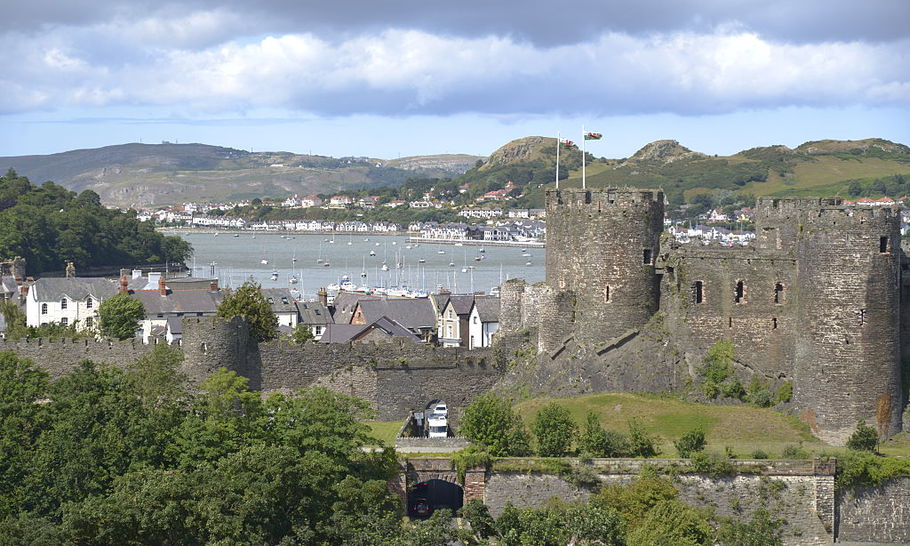Conwy: the place austerity hit hardest

(Photo by Jonathan Nicholson/NurPhoto) (Photo by NurPhoto/NurPhoto via Getty Images)
Two bridges connect Conwy and Llandudno.
One, the Conwy Suspension Bridge, commutes between Chester and Holyhead. It’s a pretty journey, passing by Snowdonian snow-caps and greats vistas of flintern Welsh beauty.
The other is Conwy Rd, where the A547 passes into the walled town of Conwy itself. This second bridge has a footpath with views, and a chance to realise there is a hinterland between Llandudno and the famous walled town.
There, great moors of halted development betray sweet scenes of stacked chimneys, and litter tumbles around red-brick streets. Tall glass windows glisten across to a harbourside where industry struggles and old signs rust. Depending on which side of the River Conwy you stand, the low tide can look austere or romantic.
It was on this walk from Llandudno’s industrial suburbia into Conwy that I wrestled with the cliché of Dickensian difference. This is when two worlds sit atop each other, deeply interrelated in their geography and yet miles apart in circumstance.
I mention both bridges, because, during my time at Bangor University, I used just one. To me, it was a pretty coastline I traversed by train to visit my family. I saw parts of my own nation as mere roads, never stopping to comprehend the lives that depended on those towns and villages.
It takes careful travel to respect a locale in real terms. My passing attention certainly never allowed me to realise the relationship between Conwy and its broader borough. Then, a Centre for Cities (CfC) study on austerity inspired me to revisit the Welsh peninsula.
The report revealed that, across UK cities, street cleaning is down 30% from 2009. In 2016, Conwy County Borough (the area cornered roughly by Llanfairfechan, Rhyl, the south of Gwydir Forest, and the west of Corwen) announced it would temporarily reduce its refuse collections to a monthly basis for 10,300 homes, claiming £390,000 of yearly savings could be made in the process.
Chagrin on this matter is well documented on most national and local news outlets, including numerous photographs of overflowing bins and interviews with residents. There has been little agreement on this at the social or political level since. Still, the scheme was made county-wide in September 2018.
The 30% reduction cited by the CfC think tank does not take small communities like Conwy into consideration, because they are focused on “the performance of UK city economies”. It is therefore hard to precisely describe the broader significance of these figures. This task falls to journalists and local scholars. So, I visited Conwy with a question in mind:
If the CfC posits street cleaning as an index of city development, what does it mean that a small town like Conwy collects its bins every month?
The 2014 Social Mobility Commission found that Conwy is among the worst places to grow up in Wales. Just 69% of children aged three to seven achieve outcome five or above in the Foundation Phase Indictor, the Welsh Government’s metric for early years education. That makes it the worst performing borough in Wales. Being on free school meals in Conwy correlates heavily with poor Key Stage 2 performance. Median salaries and job performance are among the worst in the country too, and only Neath Port Talbot ranks worse in overall social mobility.
While by no means the poorest part of Wales, the workers and families that surround this old castle can do little to improve their lot. Conwy town has high walls, but it is the borough that traps hardworking people. It is in this light that my experience crossing the bridge into Conwy town becomes significant.
Conwy town itself is gorgeous. Modern glass fills high Georgian windows along a high street made from limestone and clean brick, and it takes a while to realise the streets aren’t cobbled in the rich market-town style. Even the kebab shop looks like it might sell old Chaucers.
Conwy town is doing well. In one tea room, the servers wear pinafores, the coffee is Fairtrade, and the desserts come on a trolley. Yet, this niceness is suspect. It’s too clean. Unlike neighbourhoods beyond the walls, the demands of tourism keep every corner of Conwy town immaculate.
In Book the Second of A Tale of Two Cities, the Monseigneur of the Court has four men prepare him hot chocolate and drinks it in chambers of nose-shrivelling opulence:
“One lacquey carried the chocolate-pot into the sacred presence; a second, milled and frothed the chocolate with the little instrument he bore for that function; a third, presented the favoured napkin; a fourth…poured the chocolate out.”
This comes after a painful passage in Book the First. Wine is spilled over the flagstones of a Saint Antione square, and the populace, all poor, race to grab what they can:
“Some men knelled down, made scoops of their two hands joined, and sipped, or tried to help women, some bent over their shoulders, to sip, before the wine had all run out between their fingers. Others…dipped in the puddles with little mugs of mutilated earthenware, or even with handkerchiefs…squeezed dry into infants’ mouths…”
Not to mention how the wine spilling across Saint Antione visually evokes Llandudno’s refuse problem, Dickens’ razor-like juxtaposition provides a useful context in which to consider civil imbalance itself.
One of the cleanest towns in the UK is surrounded by a community in which debates about austerity, infrastructure, and public health bristle. Somewhere along the way, austerity policies have been more selectively applied on one side of the castle walls than the other, and it seems to be the side who’re trapped with it.
Conwy must deal with a further 1% cut in council funding over 2019/20, which means we can expect more of the same. We’d better understand the consequences before that happens. We’d better start walking across the other bridge. We’d better remember that every little town matters.





